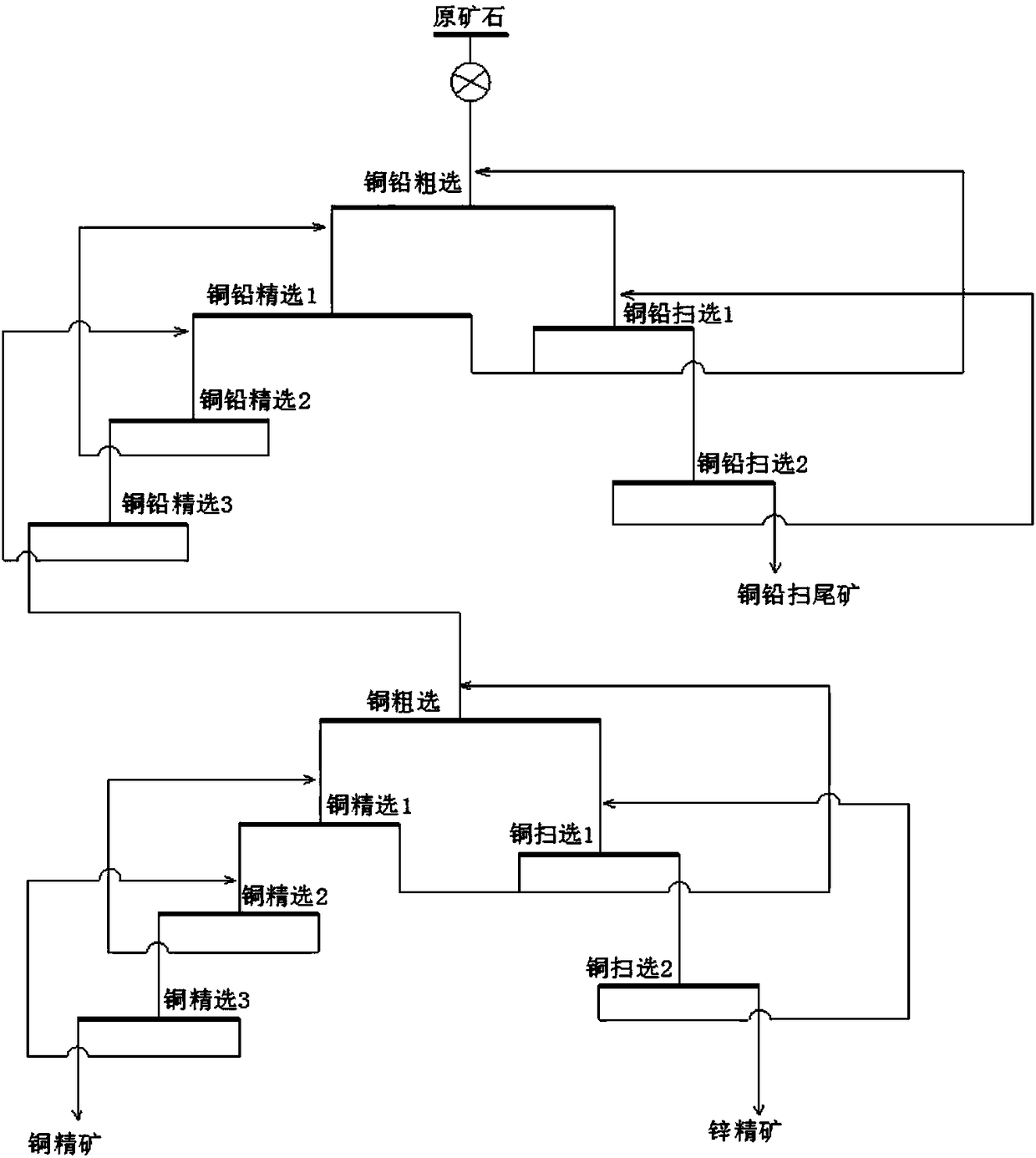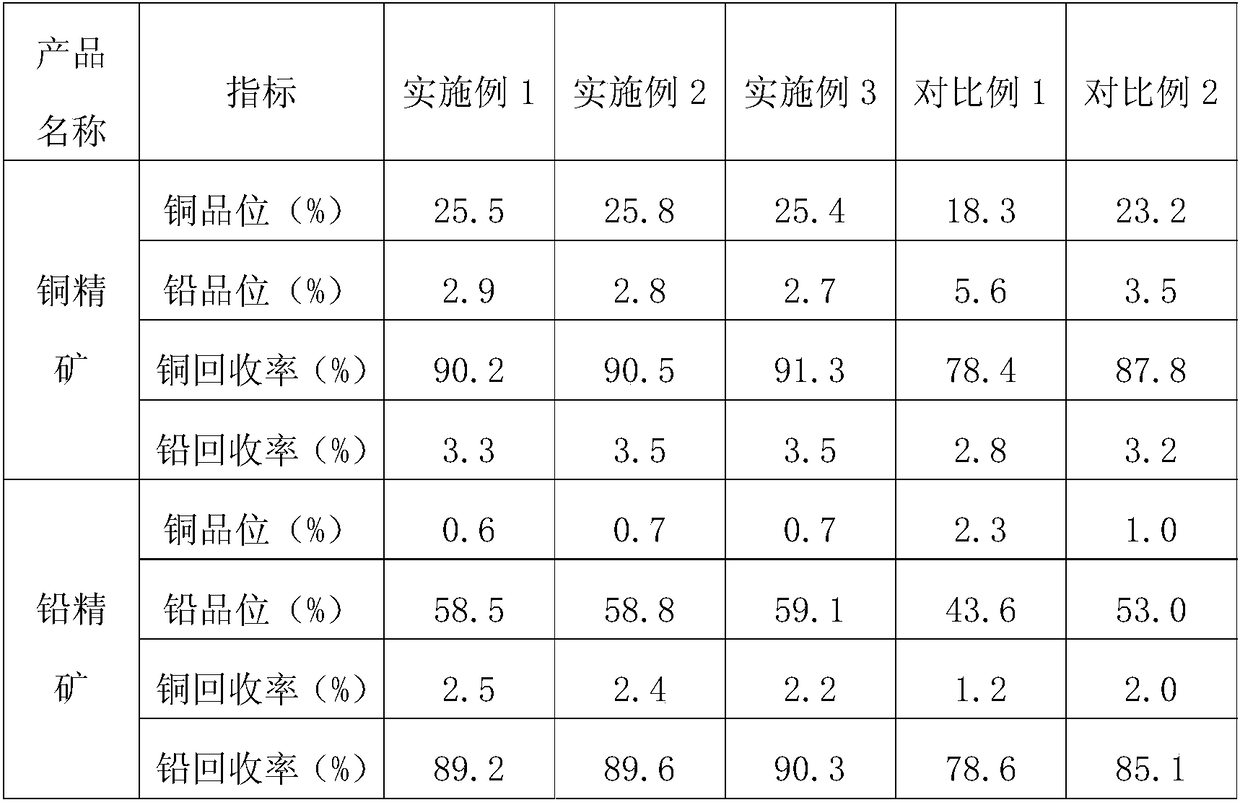Beneficiation method for copper-lead sulphide ore
A sulfide ore, copper-lead technology, applied in flotation, solid separation, etc., can solve the problems of low recovery rate of copper and lead, achieve the effect of reducing the slurry potential, increasing the recovery rate, and promoting separation
- Summary
- Abstract
- Description
- Claims
- Application Information
AI Technical Summary
Problems solved by technology
Method used
Image
Examples
Embodiment 1
[0029] A method for selecting copper-lead sulfide ore, comprising the following steps:
[0030] (1) Raw ore grinding: Finely grind the selected raw ore to obtain an ore slurry with an abrasive grain size of -74 μm, accounting for 76%.
[0031] (2) Copper-lead mixed flotation: the described ore slurry obtained in step (1) is subjected to a rough separation of copper and lead, three times of copper-lead concentration and two times of copper-lead sweeping to obtain copper-lead concentrate and copper-lead tailings . During copper-lead mixed flotation, the mass percent concentration of the pulp is adjusted to 35%, the pH is adjusted to 9, and the copper-lead medium ore produced in the copper-lead mixed flotation process is returned to the previous process in sequence.
[0032] The following reagents are added to the copper and lead roughing process: lime 2000g / t, calcium hypochlorite 600g / t, zinc sulfate 800g / t, sodium sulfite 400g / t, sodium sulfide 300g / t, dimethyl dicarbonate 20...
Embodiment 2
[0040] A method for selecting copper-lead sulfide ore, comprising the following steps:
[0041] (1) Raw ore grinding: Finely grind the selected raw ore to obtain an ore slurry with an abrasive particle size of -74 μm, accounting for 80%.
[0042] (2) Copper-lead mixed flotation: the described ore slurry obtained in step (1) is subjected to a rough separation of copper and lead, three times of copper-lead concentration and two times of copper-lead sweeping to obtain copper-lead concentrate and copper-lead tailings . During copper-lead mixed flotation, the mass percentage concentration of the pulp is adjusted to 45%, the pH is adjusted to 12, and the copper-lead medium ore produced in the copper-lead mixed flotation process is returned to the previous step in sequence.
[0043] The following reagents are added to the copper and lead roughing process: lime 2400g / t, calcium hypochlorite 800g / t, zinc sulfate 1000g / t, sodium sulfite 600g / t, sodium sulfide 600g / t, dimethyl dicarbona...
Embodiment 3
[0051] A method for selecting copper-lead sulfide ore, comprising the following steps:
[0052] (1) Raw ore grinding: Finely grind the selected raw ore to obtain an ore slurry with an abrasive grain size of -74 μm, accounting for 78%.
[0053] (2) Copper-lead mixed flotation: the described ore slurry obtained in step (1) is subjected to a rough separation of copper and lead, three times of copper-lead concentration and two times of copper-lead sweeping to obtain copper-lead concentrate and copper-lead tailings . During copper-lead mixed flotation, the mass percentage concentration of the pulp is adjusted to 40%, the pH is adjusted to 11, and the copper-lead middlings produced in the copper-lead mixed flotation process are returned to the previous process in sequence.
[0054] The following reagents are added to the copper and lead roughing process: lime 2200g / t, calcium hypochlorite 700g / t, zinc sulfate 900g / t, sodium sulfite 500g / t, sodium sulfide 450g / t, dimethyl dicarbonat...
PUM
 Login to View More
Login to View More Abstract
Description
Claims
Application Information
 Login to View More
Login to View More - R&D
- Intellectual Property
- Life Sciences
- Materials
- Tech Scout
- Unparalleled Data Quality
- Higher Quality Content
- 60% Fewer Hallucinations
Browse by: Latest US Patents, China's latest patents, Technical Efficacy Thesaurus, Application Domain, Technology Topic, Popular Technical Reports.
© 2025 PatSnap. All rights reserved.Legal|Privacy policy|Modern Slavery Act Transparency Statement|Sitemap|About US| Contact US: help@patsnap.com


